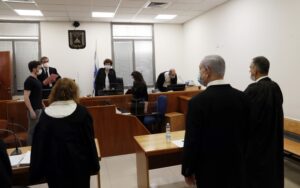
The National Interest Foundation Newsletter
Issue 91, April 9, 2021
Welcome to our NIF Newsletter. This week, we recap Thursday’s NIF Zoom event on the Nagorno-Karabakh conflict during the modern era – which included discussion regarding human rights violations there, competing narratives, and the future of Armenian-Azerbaijani relations. Meanwhile, in our news headlines: the evidentiary phase of the criminal corruption trial against Israeli Prime Minister Benjamin Netanyahu begins with the first wave of witness testimony and government officials in Jordan arrest several high-profile figures including the former crown prince.
NIF Event
This week, the National Interest Foundation hosted a Zoom event discussing the conflict in Nagorno-Karabakh during the modern era, with a focus on human rights, competing narratives, and future relations between Armenia and Azerbaijan. The panelists for the event were Ahmad Obali of Gunaz TV; Yusuf Erim of TRT World; and Hamdi Rifai of the Council of United Syrians and Americans. Moderating the panel was Khaled Saffuri, President of the National Interest Foundation. Among other topics, the panelists discussed the influence of foreign actors such as Russia and Iran, the role of the Armenian diaspora, and the changing landscape of the Caucasus as a region.
The panel began with remarks from Ahmad Obali, who gave an overview of the history behind the Nagorno-Karabakh conflict. Dating back to the 1920s, Armenia and Azerbaijan have been at odds over the region, and both were responsible for sporadic attacks on the other during this time. He also spoke of the role that Iran has played during the conflict. Iran is home to a large Azeri population, and the Iranian regime fears that a strong Azerbaijan could foster a nationalist spirit among this segment of its population which could in turn destabilize Iran domestically. Correspondingly, Iran backed Armenia through much of the conflict, supplying it with weapons and political support.
Yusuf Erim spoke next and commented on the miscalculations of Armenia’s leaders, in addition to the competing narratives from different sectors of the Armenian population. Armenian Prime Minister Nikol Pashinyan, he argued, underestimated the military superiority held by Azerbaijan, and the efficacy of Azerbaijan’s imported military technology. Drones and other devices supplied to Azerbaijan by Israel and Turkey played a significant role in tipping the scales in favor of Azerbaijan, and Armenia’s military and civilian leaders underestimated this. Furthermore, there was a misconception within Armenia over the success of the war effort. Politicians and media members reported the war was going well, despite an alternative reality on the ground. This duplicity caused major problems after the ceasefire was agreed, as angry Armenians marched on the country’s legislature and a coup plot was uncovered.
Finally, Hamdi Rifai spoke of the role that the Armenian diaspora played, among other subjects. He argued that Armenians outside of the country had a different understanding of its strengths and weaknesses, and they played a role in pushing both the Armenian government and Western nations to view the conflict in a different light. Armenians in the diaspora viewed their country as a military power to contend with, when in reality, Azerbaijan had the superior armed forces. As a result, Armenians abroad were vocal in calling for the most recent war to be continued when the facts on the ground indicated a ceasefire was in Armenia’s best interests. He also illustrated how high-profile Armenians used their platforms to demonize Azerbaijan and pressure people into sympathizing with Armenia despite not being fully informed on the subject.
To watch the entire event, including the moderated discussion and Q&A session following the panelists’ opening remarks, please click here.
News Headlines
Netanyahu Criminal Corruption Trial

The ongoing trial continues while Netanyahu is tasked with trying to form a new government following another recent inconclusive election. (Photo from AP)
The Evidentiary Phase of the Criminal Corruption Trial Against Israeli Prime Minister Netanyahu Begins
Earlier this week, the evidentiary phase of the criminal corruption trial against Israeli Prime Minister Benjamin Netanyahu began with the first wave of witness testimony. Prosecutors laid out the ways in which the incumbent prime minister used his political power to secure favors in an effort to ensure the continuation of his rule and promote his personal interests. They also detailed how the criminal indictments were based on both concrete and circumstantial evidence that will ultimately prove his guilt. The ongoing trial coincides with Netanyahu’s involvement in coalition deliberations, as he has been tasked with trying to form a new government despite the slim prospects of doing so after yet another recent inconclusive election and the credible nature of the criminal charges against him. Thus, analysts point to the multilayered governmental crisis that is currently taking place with a sitting premier facing serious legal challenges while political gridlock also looks set to continue with a potential fifth nationwide election in a span of just over two years appearing likely in the coming months.
Jordan Arrests Several High-Profile Figures

Several prominent figures were arrested in Jordan after the thwarting of an alleged coup plot. (Photo from AFP)
Government Officials in Jordan Arrest Several High-Profile Figures Including the Former Crown Prince
The Jordanian government announced this week that it had foiled a coup plot involving several members of the royal family. Former Crown Prince Hamzah bin Hussein was arrested alongside 16 others for “attempts to jeopardize the safety and security” of Jordan. Some of the additional prominent figures that were implicated include Bassem Awadallah, a former chief economic advisor to King Abdullah II, and Sharif Hassan bin Zaid, a member of the royal family. Hamzah bin Hussein is a popular figure in Jordan, particularly among tribal communities. However, King Abdullah was criticized during several tribal meetings that the prince attended, and experts have noted that this brought Hamzah under intense scrutiny. Prince Hamzah denied all of the allegations surrounding him in a video leaked to foreign media outlets and said he was under house arrest with his family, and has since signed a letter declaring full loyalty to the king. In the aftermath of this latest series of developments in Jordan, many of the country’s allies including the United States released statements backing King Abdullah and his security services.
